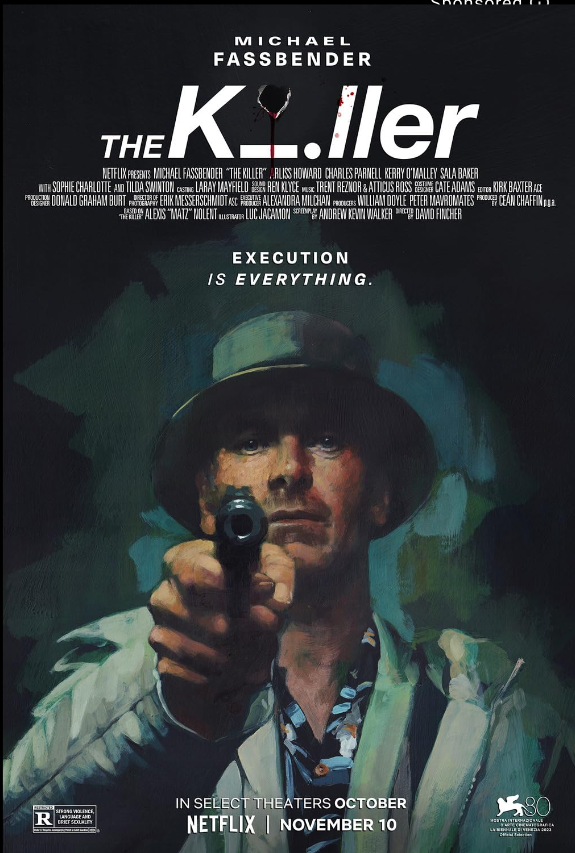'The Killer' Review
Photo Courtesy: Netflix
‘The Killer’ opens with a miss only to make its mark thereafter. Marking their most recent collaboration since ‘Se7en’ (1997), director David Fincher and writer Andrew Kevin Walker have crafted a thrilling vision destined to exist on the small screen alone. This is a pity but only partly; so perfectly does this movie capture the viewer’s brain-voice that it encourages countless, revised viewing. The ability for a film to grip its viewer vice-like only to spit them out mercilessly upon closing credits is priceless. One week on from my own viewing, I finally feel capable of recording the following thoughts.
There is something admirable about a movie so utterly self-aware. This is clear from its gloriously simplistic title. ‘The Killer’, an American adaptation of a 1998 French graphic novel series originating in 1998, follows an unnamed contract killer patiently awaiting his next target. In less delicate hands, this film could be fatally undermined by the limits of its premise. Recognising the qualities inherent in this pared-back story, Fincher and Walker double-down on the relative mundanity of the titular character. This is no eccentric, jet-setting spy vehicle; rather, the ability to withstand boredom is key. This is ably assisted by Michael Fassbender, whose intelligent portrayal of a reserved anti-hero harkens back to Hollywood’s silent movie era, providing a blank canvas upon which the audience can foist their own expectations and opinions.
Throughout the extensive opening scene, a crucial staging-post for what follows, we are introduced to our protagonist principally through recursive inner monologue and distinctly affected motions. Note the reusable camping cup, only ever drunk from with tightly fitting nylon gloves, or the carefully monitored heart rate. In less sensitive hands, this could easily venture into caricature. Yet in this instance, from humorous riffs on tourist stereotypes to chillingly mundane disguises, we are reminded that this does not aspire to be an epic story populated by larger-than-life characters. Rather, the creative duo work within the carefully orchestrated confines of a minimalist story to craft something truly greater than the sum of its parts.
This is where the movie serves its production company admirably. In contrast to the ways in which numerous acclaimed directors have utilised streaming companies to enforce excessive lengths, its runtime is perfectly amenable to single-sitting viewers. This is encouraged by a well-composed story that spans various locales worldwide. We are treated to a different adversary in nearly every location-cum-scene. While sceptics may perceive this as formulaic, it grants the film a further note of clarity that encourages viewers to appreciate the build-up towards catharsis. Notice the change in language as the story progresses, from repeated urges to stick to “the plan” subtly shifting to “your plan”, to accurately effect a loss of control. Or our killer’s decision to scrap his fiercely monitored heart rate before a delightful fight set-piece worthy of ‘John Wick’. These are some of the many thoughtful, inventive ways of rendering a story that encompasses control, retirement, ageing, and various other themes and ideas in between.
It is worth considering, too, the ways in which Fassbender is ably supported by a cast who enter the movie, assume an almost dominant position in the frame, only to withdraw just as abruptly at each scene’s culmination. This effect illustrates one of the many themes of the movie which is the disposability that modern consumer-capitalism enforces on us all. We meet our protagonist in an abandoned ‘WeWork’; unfettered access to every conceivable consumable item has fatal consequences for our perceptions of security, even at home; each person involved is, as Fassbender intones, one of the many who serve the few. As such, admirable turns from the likes of fellow hired killer Tilda Swinton and ex-Law professor Charles Parnell amount to little more than servants to the story. This does not render the film facile or irrelevant, however. Rather, it encourages the viewer to look beyond its exterior stylings and consider what it actually amounts to in the end. Which is one reason why the closing shot proves so effective, if not also harrowing.
Some movies bear the mark of their creator so clearly they evoke a stick of rock from Scarborough Beach. Marking Fincher’s fourth decade of mainstream familiarity since ‘Alien 3’, ‘The Killer’ bears the hallmarks of meticulous, detail-oriented filmmaking throughout. What this represents is not just a film but a statement, a shot of electricity directly into the nervous system, that leaves its viewer thrilled and thoroughly shaken.

